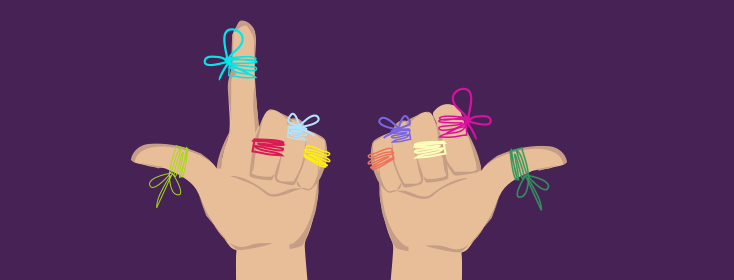Tips for Managing Chemo Brain
Cancer patients have been experiencing chemo brain for decades. Chemo brain significantly impacts patients’ daily activities. However, the medical community has only recently started taking chemo brain seriously.
Inspired by the article “My Chemo Brain,” written by fellow lung cancer survivor and LungCancer.net contributor, Jennifer Toth, I wanted to share some things I learned to manage my chemo brain during the past 12 years.
Tools for memory assistance
Remember the old saying about tying a string around your finger to help you remember something? Well, it may work if you have only one thing to remember. These days people are so busy they have literally thousands of things to remember. When cancer and its treatment damages our ability to focus and recall meetings, responsibilities, errands, etc., we may need a little help.
A smartphone is a very helpful tool for memory assistance. Several of the tools used in memory assistance are included as free apps in a smartphone. Part 1 of this article applies to ways to use smartphone apps. Part 2 will address tips that are simply thought processes that help trigger or jump-start a simple memory, such as, why did I enter this room?
Below are three tips using smartphone apps that help me function effectively even with chemo brain.
Set timers as reminders
Rule number 1. Never trust your memory. I set timers on the stove and my iPhone for things I need to remember, especially if it’s something potentially dangerous. For example, I may start to make a batch of pasta sauce. I usually start by heating a little olive oil and adding my spices. But if I get distracted…by a phone call or my husband asking me a question or a kitty wanting to be fed or I suddenly remember I need to buy an onion and off to the store I am. Meanwhile, my house could go up in smoke. I set timers to remind myself that I am cooking, even when I am in the kitchen. Embarrassing, I know. But it is for safety. I set a timer reminder to put the laundry in the dryer (or take it out). I set a timer when I have a conference call. If I have multiple commitments during the day, I set a timer for the first event; when that goes off, I set the time for the next event. There are many other ways to set these reminders. My son—who doesn’t even have chemo brain—uses Google to remind him to do things. “Google, remind me to pick up Ava from school at 3 o’clock.” I usually just set the timer feature of the clock app on my iPhone.
Use lists to stay on track
I make lists for everything. But what good is a list if you forget where you left it? I have learned—or am learning—to create my lists in my phone’s Notes app where I can easily make edits even without pen and paper handy. More importantly, it is always with me because I rarely forget my phone. I can also email or text the list to myself as a way to remind myself. I can reuse it another time when I may need a similar list. For example, I keep a standard “List of Things to Pack.” I actually keep a printout in my dresser drawer. Instead of recreating a list every time I travel, I use this same checklist whenever I pack. (Also, if you prefer paper to electronic lists, keep all your lists in one notebook, rather than scrawling notes on scattered pieces of paper throughout the house, which is a waste of time and paper.)
Mark it on your calendar
Anything important goes on my calendar. This morning, for example, my kitty needs to go to the vet. Later, I have a meeting with someone about a project. I also add things that are not important but still need to be on my calendar or it will not get done. For example, I need to transfer money from one bank account to another every month. A calendar reminder helps ensure that gets done. The calendar has an option to set an alert as a reminder. The default is 15 minutes prior to a scheduled event. That helps, too. However, I don’t rely on those reminders alone. If the event is important, I also set the timer to sound an alarm at the appropriate time.
Tips for Managing Chemo Brain: Part 2 of this series addresses thought processes that help me. Have you discovered techniques or tool to help cope with chemo brain? If so, please share in the comment section.

Join the conversation